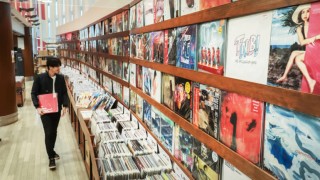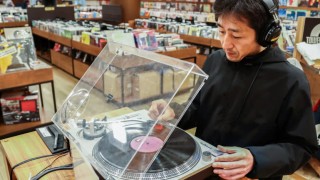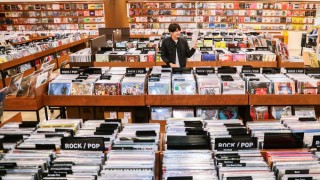Loading
Search
▼ Japan's Music Industry Rises Again In New 'Age Of Discovery'
- Category:Other
World's second-biggest market sees growth in live music and physical sales
TOKYO -- On a chilly evening last month, tens of thousands of people gathered at the Saitama Super Arena near Tokyo, one of Japan's biggest live music venues. People of all ages were thrilled to witness rock legends in action: Ireland's U2.
The band was in the midst of a world tour taking in Seoul, Manila, Mumbai and other major cities in the Asia-Pacific region. For Japanese U2 fans, the visit was special, as it was their first time performing in the country in 13 years.
Among the crowd was 32-year-old Yuki Hayashi, who goes to at least 10 live shows a year.
"I feel happy to be in the same place where my favorite artists are," he added, saying that he has already booked a ticket for another concert in a few months' time," said Hayashi.
Hayashi is not alone. Despite plummeting CD sales, Japan's music industry is turning the live music experience into a major new pillar of growth.
According to the All Japan Concert and Live Entertainment Promoters Conference (ACPC) organization, total audience attendance for all concerts reached 48 million in 2018, up 25% from 2013, and generating 345 billion yen ($3.15 billion) in sales, a 49% increase from five years earlier. The number of performances has also increased 43% over the same time period.
Hiromichi Hayashi, CEO of Hayashi International Promotion, Japan's leading concert promoter, said that concerts and merchandise are becoming increasingly important as a revenue stream for artists. "Many artists know that show business is not forever. When you can't make money from CDs, you have to sell tickets and merchandise to instantly cash in," said Hayashi.
Ticket prices for live shows are also increasing. According to ACPC data, the average ticket price was 4,771 yen in 2008. It increased to 7,092 yen in 2018 -- up 49% in a decade.
"It is simply a matter of supply and demand," said John Boyle, President of Live Nation Japan, the Japanese subsidiary of American concert promoter Live Nation, which put on the U2 concert in Saitama. "Every venue is full every single night."
TOKYO -- On a chilly evening last month, tens of thousands of people gathered at the Saitama Super Arena near Tokyo, one of Japan's biggest live music venues. People of all ages were thrilled to witness rock legends in action: Ireland's U2.
The band was in the midst of a world tour taking in Seoul, Manila, Mumbai and other major cities in the Asia-Pacific region. For Japanese U2 fans, the visit was special, as it was their first time performing in the country in 13 years.
Among the crowd was 32-year-old Yuki Hayashi, who goes to at least 10 live shows a year.
"I feel happy to be in the same place where my favorite artists are," he added, saying that he has already booked a ticket for another concert in a few months' time," said Hayashi.
Hayashi is not alone. Despite plummeting CD sales, Japan's music industry is turning the live music experience into a major new pillar of growth.
According to the All Japan Concert and Live Entertainment Promoters Conference (ACPC) organization, total audience attendance for all concerts reached 48 million in 2018, up 25% from 2013, and generating 345 billion yen ($3.15 billion) in sales, a 49% increase from five years earlier. The number of performances has also increased 43% over the same time period.
Hiromichi Hayashi, CEO of Hayashi International Promotion, Japan's leading concert promoter, said that concerts and merchandise are becoming increasingly important as a revenue stream for artists. "Many artists know that show business is not forever. When you can't make money from CDs, you have to sell tickets and merchandise to instantly cash in," said Hayashi.
Ticket prices for live shows are also increasing. According to ACPC data, the average ticket price was 4,771 yen in 2008. It increased to 7,092 yen in 2018 -- up 49% in a decade.
"It is simply a matter of supply and demand," said John Boyle, President of Live Nation Japan, the Japanese subsidiary of American concert promoter Live Nation, which put on the U2 concert in Saitama. "Every venue is full every single night."
Confident that there is much more room for Japan's live music market to grow, Boyle said the real problem facing tour promoters in Japan is a shortage of venues.
"We will see significant growth after the 2020 Olympics," said Boyle. Live Nation Japan is part of the consortium managing the newly built Ariake arena, which will be the volleyball venue for the Tokyo 2020 Olympic Games and then converted to an entertainment venue later. "In five years the market could grow another 25%," he said.
On top of succeeding in the concert business, there are other signs that Japan's music market -- the world's second-largest -- is growing again after years of contraction. According to the Recording Industry Association of Japan, the domestic music market expanded for the first time in three years to 304.8 billion yen in 2018, up 5% from the previous year.
An important growth driver is streaming. Sales from streaming, including subscriptions and advertising revenue, reached 34.9 billion yen in 2018, up 33% from 2017, driven largely by the launch Swedish-based Spotify's Japanese service in 2016.
"At first, streaming was thought of as competition for CD sales," said Noriko Ashizawa, head of content at Spotify Japan. Widely seen as a distupter, Ashizawa said many Japanese record labels simply refused to allow Spotify access their artists' song catalogues.
But with many previously unknown Japanese artists now building a global fan base thanks to Spotify, including masked dance music act AmPm, female singer and songwriter Aimyon, pop band Official HIGE DANdism and boyband Arashi, Ashizawa said Japan's big music labels had come full circle, and were now happy to see Spotify stream their artists songs.
While Spotify refuses to disclose the breakdown of how its users are distributed, it has 248 million listeners worldwide, nearly half of which are paid subscribers. "Consumers are less hesitant to pay for streaming due to the attractive offers provided by the music streamers which provide a relatively low cost of adoption," said Abhilash Kumar, Research Analyst at Counterpoint Research.
Spotify offers opportunities to discover new artists by analyzing users' listening history and suggesting songs that may suit their tastes based on the data.
Artists can effectively gain access to potential fans by letting them know about their new releases and latest tour dates. "We turn listeners into fans," said Ashizawa. "Japanese fans are very passionate about their favorite artists. They want to buy something physical and also want to go to live shows."
Live Nation Japan's Boyle agrees: "There's a correlation between streaming and live markets. As streaming grows, live music will grow as well. As streaming increases, investment into developing artists will increase."
"We will see significant growth after the 2020 Olympics," said Boyle. Live Nation Japan is part of the consortium managing the newly built Ariake arena, which will be the volleyball venue for the Tokyo 2020 Olympic Games and then converted to an entertainment venue later. "In five years the market could grow another 25%," he said.
On top of succeeding in the concert business, there are other signs that Japan's music market -- the world's second-largest -- is growing again after years of contraction. According to the Recording Industry Association of Japan, the domestic music market expanded for the first time in three years to 304.8 billion yen in 2018, up 5% from the previous year.
An important growth driver is streaming. Sales from streaming, including subscriptions and advertising revenue, reached 34.9 billion yen in 2018, up 33% from 2017, driven largely by the launch Swedish-based Spotify's Japanese service in 2016.
"At first, streaming was thought of as competition for CD sales," said Noriko Ashizawa, head of content at Spotify Japan. Widely seen as a distupter, Ashizawa said many Japanese record labels simply refused to allow Spotify access their artists' song catalogues.
But with many previously unknown Japanese artists now building a global fan base thanks to Spotify, including masked dance music act AmPm, female singer and songwriter Aimyon, pop band Official HIGE DANdism and boyband Arashi, Ashizawa said Japan's big music labels had come full circle, and were now happy to see Spotify stream their artists songs.
While Spotify refuses to disclose the breakdown of how its users are distributed, it has 248 million listeners worldwide, nearly half of which are paid subscribers. "Consumers are less hesitant to pay for streaming due to the attractive offers provided by the music streamers which provide a relatively low cost of adoption," said Abhilash Kumar, Research Analyst at Counterpoint Research.
Spotify offers opportunities to discover new artists by analyzing users' listening history and suggesting songs that may suit their tastes based on the data.
Artists can effectively gain access to potential fans by letting them know about their new releases and latest tour dates. "We turn listeners into fans," said Ashizawa. "Japanese fans are very passionate about their favorite artists. They want to buy something physical and also want to go to live shows."
Live Nation Japan's Boyle agrees: "There's a correlation between streaming and live markets. As streaming grows, live music will grow as well. As streaming increases, investment into developing artists will increase."
Despite the success of the streaming business, physical revenues, mainly from CDs, still account for nearly 70% of the Japanese market compared to just 9% in the U.S., although analysts expect that to fall more rapidly from now on.
"The CD market has reached its saturation point," said Kumar at Counterpoint Research. He added, "With the penetration of smartphones, the audience will shift from CDs to smartphone-based music streaming." It is increasingly important for artists to find a new pillar of revenue other than CDs -- their traditional revenue source -- to survive."
Ashizawa at Spotify does not believe that the Japanese physical market will immediately fade away like it did in the U.S. and U.K, stressing that streaming and physicals have different selling points.
Sales of vinyl records, that ultimate 20th century throwback, are surging, with vinyl production over 1 million units in 2018, a tenfold increase from 2010.
"I like physicals better than streaming," said Yuki Hayashi, the rock fan, who buys 40 records a month, saying, "Buying vinyl is like collecting art."
Backed by brisk demand, Sony's subsidiary Sony Music Entertainment last year resumed vinyl production after an interval of almost three decades.
"We started producing vinyl records in 2018 for the first time in 29 years, in response to the growing needs of artists who asked us to produce them again," Sony Music Entertainment spokesperson told Nikkei.
"We are producing records by a wide range of artists including western music acts such as Billy Joel and Japanese pop artists like Eiichi Otaki," the spokesman said, declining to disclose how many vinyl records Sony is producing or selling.
Music retailer Tower Records Japan started selling vinyl again three years ago and launched a vinyl specialty shop in Tokyo's Shinjuku district in March, which stocks 70,000 titles.
"In the age of streaming, people want to own something special, and vinyl offers a special experience," said Taichi Aoki, manager at Tower Records' Shinjuku store, explaining that its vinyl sales have been rapidly increasing.
"Today, there are more ways to enjoy music. Some people enjoy music through streaming and YouTube, while others enjoy it with physicals," said Aoki. "It has never been more important for artists to deliver a variety of sound sources to meet listeners' diversified demands."
"The CD market has reached its saturation point," said Kumar at Counterpoint Research. He added, "With the penetration of smartphones, the audience will shift from CDs to smartphone-based music streaming." It is increasingly important for artists to find a new pillar of revenue other than CDs -- their traditional revenue source -- to survive."
Ashizawa at Spotify does not believe that the Japanese physical market will immediately fade away like it did in the U.S. and U.K, stressing that streaming and physicals have different selling points.
Sales of vinyl records, that ultimate 20th century throwback, are surging, with vinyl production over 1 million units in 2018, a tenfold increase from 2010.
"I like physicals better than streaming," said Yuki Hayashi, the rock fan, who buys 40 records a month, saying, "Buying vinyl is like collecting art."
Backed by brisk demand, Sony's subsidiary Sony Music Entertainment last year resumed vinyl production after an interval of almost three decades.
"We started producing vinyl records in 2018 for the first time in 29 years, in response to the growing needs of artists who asked us to produce them again," Sony Music Entertainment spokesperson told Nikkei.
"We are producing records by a wide range of artists including western music acts such as Billy Joel and Japanese pop artists like Eiichi Otaki," the spokesman said, declining to disclose how many vinyl records Sony is producing or selling.
Music retailer Tower Records Japan started selling vinyl again three years ago and launched a vinyl specialty shop in Tokyo's Shinjuku district in March, which stocks 70,000 titles.
"In the age of streaming, people want to own something special, and vinyl offers a special experience," said Taichi Aoki, manager at Tower Records' Shinjuku store, explaining that its vinyl sales have been rapidly increasing.
"Today, there are more ways to enjoy music. Some people enjoy music through streaming and YouTube, while others enjoy it with physicals," said Aoki. "It has never been more important for artists to deliver a variety of sound sources to meet listeners' diversified demands."
- January 16, 2020
- Comment (0)
- Trackback(0)




